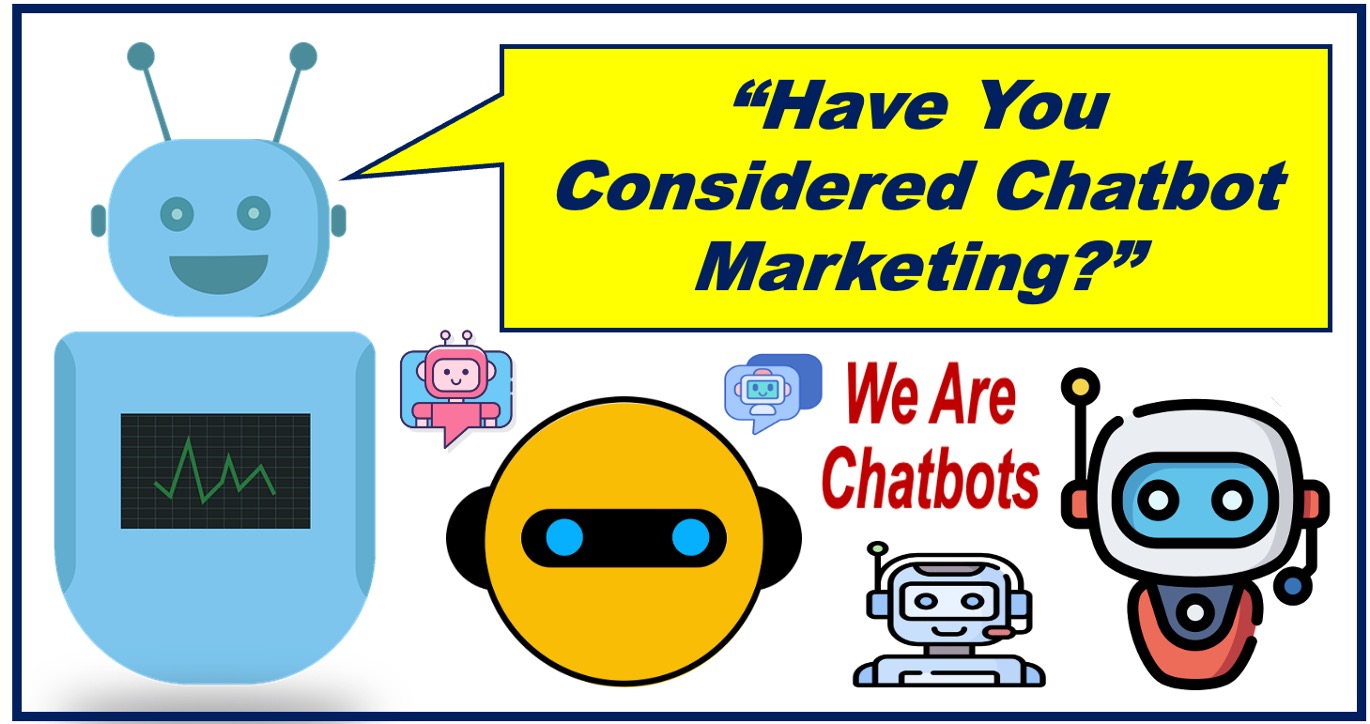Do you use chatbots to engage consumers, prospects, or existing customers? Do your chatbots provide them with personalized support and recommendations, which ultimately help boost sales? If so, you are involved in chatbot marketing.

What is a chatbot?
A chatbot is a smart virtual assistant, an online program that is integrated into a company’s customer support software. It is an online robot that chats to people.
In other words, a chatbot is a computer program that can simulate conversations with humans via messaging platforms such as SMS, WhatsApp, and Facebook Messenger.
They can be programmed to respond to user queries, understand natural language, and provide real-time assistance and information.
Intercom.com has the following definition of the term:
“Chatbot marketing is a marketing technique that employs computer programs to automate interactions with prospects and customers, either on your website or in your app, for the purpose of generating sales.”
What is a bot?
The word bot means online robot. We also call them web robots or internet robots. Bots are computer programs that perform simple repetitive tasks.
We call bots that talk to inquirers and customers chatbots.
Chatbot marketing – popular today
Over the past few years, chatbot marketing has become increasingly popular. By providing a more personalized customer experience, companies can streamline their marketing efforts, save money, and focus on other parts of the business more effectively.
With chatbots, businesses can respond to customer inquiries all day and every day. They can respond according to consumer behavior and preferences.
Chatbots can also gather valuable data about each inquirer, thus helping improve the effectiveness of marketing campaigns.
Chatbot marketing – Pros and cons
Chatbot marketing, just like other forms of marketing and business approaches, has its benefits and challenges. Let’s look at some of them:
Pros
- 24/7 Customer Service
They function round the clock, providing consistent and immediate customer support. Modern consumers like this. In fact, some even expect it.
- Cost Savings
Over the medium- to long-term, chatbots can be more cost-effective than hiring and training human customer service representatives.
- Scalability
They can deal with multiple inquirers at the same time. This is something human beings cannot do. As the business grows, chatbots cope with increasing demand comfortably.
- Data Collection
They can systematically gather and analyze user data. This can help businesses better understand customer preferences and behaviors.
- Personalization
After gathering data on user preferences, behaviors, etc., chatbots can personalize product recommendations. They can do this instantly, without having to check their notes.
- Consistent Responses
There is no risk of errors caused by fatigue, mood, or lack of attention. Chatbots’ responses are consistent. No matter how angry an inquirer becomes, chatbots maintain their cool.
- Easy Integration
Most chatbots can be seamlessly integrated into popular messaging platforms, such as Facebook Messenger or WhatsApp.
- Multilingual Support
You can program chatbots to interact in multiple languages.
Cons
- Limited Understanding
Chatbots may struggle with complex or nuanced questions, leading to customer frustration.
- Lack of Empathy
They can’t replicate human emotions, which might result in a less empathetic customer service experience during sensitive issues. Customers may not like it if they get the impression that the bot is simply reacting according to a bunch of codes.
However, as AI becomes more sophisticated and ‘human-like,’ these problems may eventually disappear.
- Technical Issues
Like any other software, chatbots can malfunction, which can affect customer service quality.
- Over-Reliance
Sole reliance on chatbots can alienate customers who prefer human interactions. If the system is down and human employees do not know the answers to most questions, how will they cope? And more importantly, what will customers and prospects think?
A prospect is somebody who you think could well turn into a paying customer.
- Security Concerns
Chatbots might be vulnerable to hacking if not properly secured. This could put confidential business data at risk.
- Implementation Costs
Initial setup costs can be costly. However, in the long run, you will most likely find that it was a worthwhile investment.
- Potential for Miscommunication
If the chatbot misunderstands certain instructions or data, it may relay incorrect data.
- Unemployment
The introduction of chatbots could lead to job losses for humans.
While chatbot marketing offers various benefits, it’s crucial for businesses to strike a balance between automation and human touch to provide the best customer experience.
Find a good specialist
If you want to implement a chatbot marketing strategy, you will need to work with a specialist company that can create a customized chatbot for your business.
The programmer should create a chatbot that understands what the customers wants and what responses would most useful, interesting, and engaging for them.
Marketing techniques
After installing it, you can use various marketing techniques to promote it and encourage consumers to engage with it.
You could, for example, place chatbot buttons or links, social media profiles, or email campaigns. A good chatbot can send personalized messages to consumers based on what they like and how they behave.
Video explanation
This Marketing Business Network video explains what chatbot marketing is in a way that’s simple and easy to understand:
Conclusion
Chatbot marketing can save you money, improve customer experience, and allow you to focus on other parts of your business. They can really help your website thrive. However, it is crucial to make sure that you program and set it up properly.
